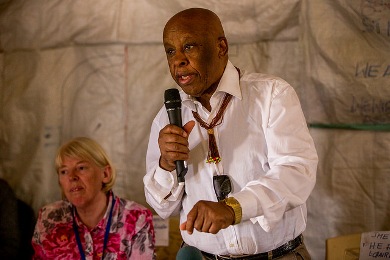South Sudan peace monitors call for regional efforts to end civil war
November 20, 2017 (JUBA) – The head of South Sudan peace monitors on Monday issued a statement calling for a “unified” and “one voice” message to end the conflict in the East African nation.

“I also reinforced the One Voice message, and the need for the region to approach revitalization unified and with strength of purpose. Collectively, the IGAD Heads of State must prevail over the South Sudanese leadership to rethink the current trajectory of the country and take the necessary steps to restore peace and inclusive governance”, he told a plenary session held in the capital, Juba.
The former Botswana president unveiled five point approach to end the war, if accepted and implemented by parties without hesitation.
He explained that an inclusive political process, which brings together all parties and estranged groups and a cessation of all hostilities and a renegotiated permanent ceasefire that includes all armed groups, was one of the best approaches. The approach, he said, is the establishment of transitional security arrangements with robust verification and enforcement mechanisms.
Other approaches proposed by the JMEC chairperson, also included a clear plan of action to address the current dire humanitarian situation and facilitate eventual voluntary return of IDPs and repatriation of refugees and an enforcement mechanism that includes accountability measures for spoilers and violators.
Mogae called for specific reforms to ensure conduct of credible, free and fair elections at the end of a transitional period and dedicated funding for implementation of the revitalized peace agreement.
The official, however, said the current security situation in South Sudan remains fragile, renewing calls to stop the fighting, end the violence, deal with criminality, prevent sexual and human rights abuses, improve human suffering and address the economic crisis.
Mogae said violations of the ceasefire has continued since the last plenary joint briefing was held, leading to the publication five violation reports, one of which highlights the extent of sexual and gender-based violence perpetrated by uniformed men in Yei River state.
United Nations monitors, in a confidential report presented to the Security Council last week, accused South Sudan government of using food as a weapon of war to target civilians by blocking life-saving aid in some areas, an allegation South Sudanese authorities have dismissed.
This came a month after another UN report said the South Sudanese government bears “primary responsibility” for incessant violence in the world’s youngest nation.
The five-member panel established by the UN Security Council cited an absence of political will to implement a 2015 peace agreement and to address “the destructive governance practices and historical grievances that continue to drive the conflict in South Sudan.
The experts attributed these failures to the political and military elite of the country, with the primary responsibility for the ongoing violence resting with those in the government led by President Kiir and the first vice-president, Taban Deng Gai.
The South Sudanese conflict has killed tens of thousands and displaced over two million people.
(ST)
